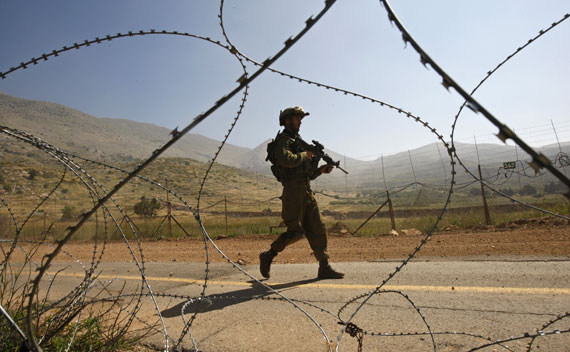The Israelis and Palestinians: No Deal
More on:

Yesterday was the 44th anniversary of Israel’s lightning victory over the Egyptians, Syrians, and Jordanians in the 1967 war. Like the observance of al naqba, or the disaster (which coincides with Israel’s founding) of a few weeks ago, the observance of the anniversary of al naqsa—the setback—was tense. Syrians, along with Palestinians in the West Bank, Gaza, and Lebanon have sought to use social media to build a non-violent movement to challenge Israel on its borders during these highly charged anniversaries. (The Assad regime—eager to shift public and international attention away from the upheaval in Syria—has helped, busing Palestinian refugees from camps near Damascus to the Golan Heights). In all, 22 people in on the Syrian side of the line were killed yesterday and another 350 wounded. Against the broad history of the Arab-Israeli conflict, these demonstrations and the much larger ones in May are hardly remarkable.
Yet for all its banality, the demonstrations on May 15 and June 5 reveal in the starkest terms why there is not going to be a deal between Palestinians (along with the wider Arab world) and Israelis. The protests, which featured Palestinians bearing keys and deeds to property lost in Israel’s creation, reflect nothing less than the mutually exclusive legitimacies that are the core of the Arab-Israeli conflict—the Jewish connection to the land juxtaposed with Palestinian demands for justice through return to their homes.
These mutually exclusive legitimacies are the reason why, for example, Israeli governments have begun demanding that the Palestinians recognize Israel as a “Jewish State” as a sine qua non of any final peace deal. At first blush, it seems odd and indicative of the Israeli leadership’s own doubts about the country’s legitimacy in the Middle East to demand that their adversaries accept the “Jewishness” of Israel as a condition for peace. Yet, prying recognition of Israel’s Jewish character from Mahmoud Abbas would have the politically beneficial effect (for Israel) of Palestinian self-abnegation. That’s precisely why the Palestinian leadership not only refuses this condition, but, in response, invokes the Palestinian right of return to Israeli territory as a way of leaving open the question of Israel’s legitimacy in the region.
The Palestinian denial of Israel’s legitimacy and Israel’s denial of responsibility for the Palestinian refugee problem suggests that each side sees the other as ephemeral, a problem that will eventually go away, leaving those who believe this narrative to conclude (erroneously) that they have time on their hands. They don’t, but in an environment where neither side actually recognizes the other—despite protestations to the contrary—and believes they can outlast their adversary, the chances of a deal bringing the Israeli-Palestinian conflict to an end are remote.
More on:
 Online Store
Online Store
